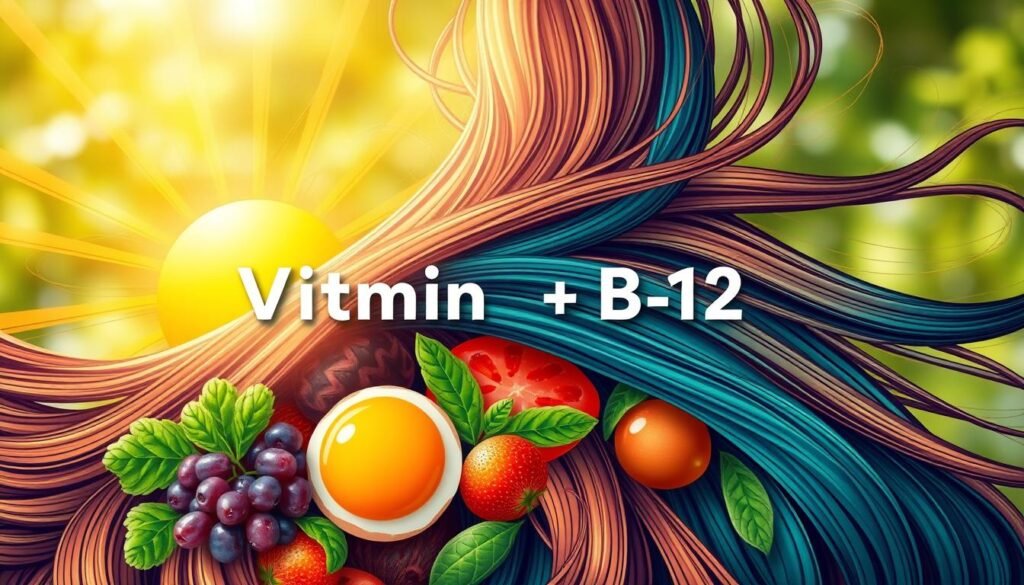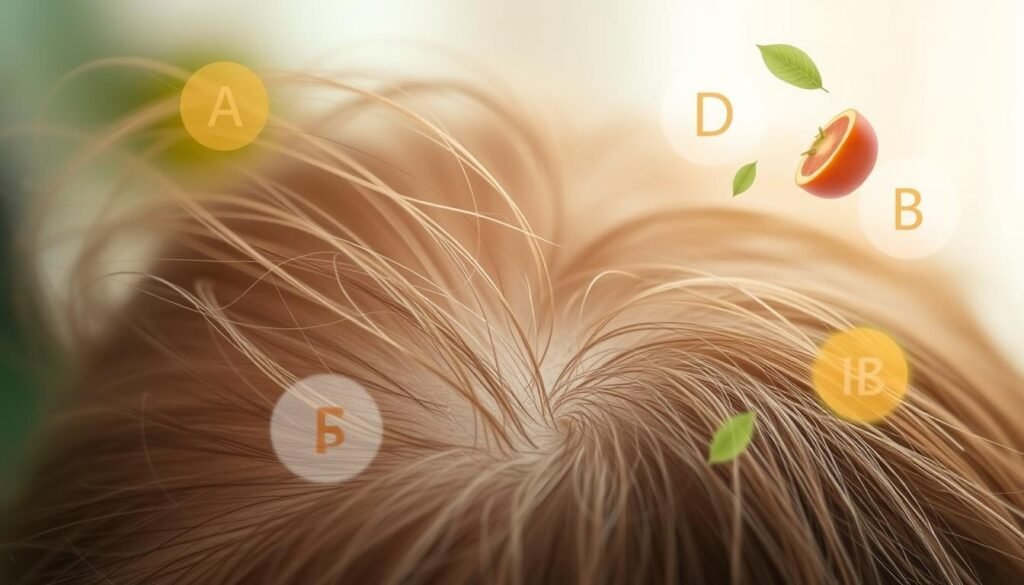Did you know around 50 million men and 30 million women in the U.S. face hair loss? This huge number points to a big worry that’s not just about looks. It deeply affects how people feel about themselves. Often, people don’t realize that not having enough vitamins can lead to hair loss. Getting the right nutrients is key to keeping hair follicles healthy. It’s important to know when to get help from a doctor for these shortages. This article will look into how vital vitamins are for hair, show the signs of not having enough, and tell you why getting medical advice is needed.
Key Takeaways
- Hair loss affects millions, impacting emotional health.
- Vitamin deficiencies can play a significant role in hair loss.
- Consulting a healthcare provider is crucial for proper diagnosis.
- Identifying symptoms of deficiencies may help in treatment.
- Understanding available treatments can improve outcomes.
Understanding Hair Loss: Common Causes and Types
Hair loss, often called alopecia, comes from different causes. These include genetics, hormonal changes, stress, and medical conditions. Adults typically have up to 150,000 hair follicles on their scalp. It’s normal to lose about 100 hairs each day.
Because 90% of hair is growing at any time, losing some every day is normal. This growth phase lasts from 2 to 8 years.
People can face various types of hair loss. Androgenetic alopecia, or pattern baldness, affects men and women at different ages. Men might see thinning hair in their 20s, women often in their 40s or later.
Alopecia areata causes patchy hair loss. It happens when the immune system attacks hair follicles. Luckily, about 90% of those affected see their hair grow back in a few years.
Telogen effluvium is hair loss from stress, like after having a baby or surgery. Then, there’s scarring alopecia. It happens when inflammation destroys hair follicles for good.
Severe cases, like alopecia universalis, can make people lose all body hair, including brows and lashes. Genetics is a big reason behind hair loss. By understanding different types of hair loss and their causes, people can take action. They might fix nutritional issues or get medical help.
The Role of Nutrition in Hair Health
A well-balanced diet is key to keeping our hair healthy. If we don’t get enough nutrients, our hair suffers. This can mean thin, weak hair and even a lot of hair falling out. Studies show that vitamins help our body work right and protect our hair cells.
Eating the right nutrition is super important. Vitamins A, C, D, E, and B are great for our hair. If someone is losing their hair, they should check their diet. Small changes in what they eat can make a big difference.

What we eat can affect our hair differently, depending on who we are. For example, vegetarians and vegans might not get enough iron and zinc. These nutrients are often missing in their diets and are linked to hair loss. Almost half of all men and women will deal with hair loss by the time they’re 50. That’s why it’s so important to eat right.
We need to make sure we’re getting the right nutrition for strong hair health. By focusing on good vitamins and nutrients, we can fight hair loss. This helps us keep our hair looking good.
Key Vitamins Linked to Hair Growth and Health
Nutrition plays a big part in how healthy our hair looks. Vitamin D and B12 are especially important for strong and growing hair. They help keep hair healthy by playing unique roles in its growth.
Vitamin D: The Sunshine Vitamin
Vitamin D is vital for making new hair follicles. These are the small pores from which hair grows. Studies show that low levels of Vitamin D can lead to hair loss. Getting enough Vitamin D from the sun, fish, and certain foods can make hair fuller and stronger.
Vitamin B12: Essential for Growth
Vitamin B12 is important for creating DNA and making red blood cells. These cells are needed for hair to grow and stay healthy. People who don’t eat meat or animal products might not get enough B12. This can make their hair thin or fall out. Luckily, eating foods like meat, fish, dairy, and cereals with added B12 can help.

| Vitamin | Role in Hair Growth | Sources |
|---|---|---|
| Vitamin D | Promotes formation of new hair follicles | Sunlight, fatty fish, fortified foods |
| Vitamin B12 | Essential for DNA synthesis and red blood cell production | Meat, fish, dairy products, fortified cereals |
Symptoms of Vitamin Deficiency Related to Hair Loss
It’s key to spot signs of vitamin shortage to tackle hair loss causes. People might see different hair loss symptoms tied to low vitamins. These affect hair health and growth.
Identifying Signs of Low Vitamin Levels
Some common signs of lacking vitamins include:
- Excessive hair fall, thinning locks, and dry or brittle hair.
- Slower growing hair or changes in hair texture.
- Other signs like fatigue, mood swings, and feeling weak.
Vitamin D shortage affects cells needed for hair growth, leading to more hair loss. Vitamin D lack may also cause joint pain, muscle weakness, and tiredness.
Iron is key in moving oxygen to the hair roots. Not enough iron could mean more hair falling out. People might feel dizzy, have headaches, and feel tired, which are signs of not having enough iron.
Lacking folic acid can cause breath shortness and headaches with hair loss. Low levels of zinc and Vitamin E may lead to poor hair health and slow healing of wounds.
If you notice these symptoms of vitamin deficiency, see a doctor. Blood tests can help find out vitamin and mineral levels, which helps in getting the right treatment.

Knowing these links highlights how key nutrition and overall health are. Eating a well-balanced diet full of important vitamins and minerals can help improve hair loss symptoms. It also supports overall health.
When to Consult a Healthcare Provider
Hair loss that doesn’t stop might show deeper health problems. Catching it early helps find the right fix. If you notice a lot of hair falling out, bald spots, or your hair’s texture changing, you should get healthcare advice. Knowing when to consult a healthcare provider is key for getting diagnosed and treated correctly.
Recognizing Persistent Hair Loss
Watching for changes in how much hair you lose is crucial. An uptick in shedding or seeing bald areas are signs to get checked. Also, watch out for other symptoms like feeling tired more than usual or if your scalp bothers you. These signs can help doctors figure out what’s wrong more clearly.
Understanding Related Health Symptoms
If hair loss comes with unexplained weight changes, always being tired, or getting sick a lot, it’s time to see a doctor. These symptoms can hint at underlying health issues. Using resources like professional consultation protocols means you’ll get the best care quickly and effectively.
Diagnostic Tests for Hair Loss: What to Expect
When you start losing hair, you might want to know which diagnostic tests can find the cause. Going to a doctor who knows a lot about hair and scalp issues is the first step. They might suggest different tests to get a clear picture.
One way to look closer is by using a special tool like the Folliscope®. It makes the scalp look 100 times bigger than it is. This helps to check hair thickness and scalp health closely. Another simple test is the pull test. If pulling gently removes six or more hairs, it suggests you’re losing hair actively.
Blood tests are also key in figuring out what’s wrong. They can show if you’re missing important nutrients, have hormone issues, or other health problems like thyroid disease or lack of iron. Checking ferritin levels helps understand iron status, and thyroid-stimulating hormone (TSH) levels check thyroid health.
Looking for fungi in hair or scalp cells is another step, done through a fungal culture. A scalp biopsy might even be done to confirm infection causes when needed. Doctors could also take photos. They compare these over time to see how well treatments are working.
Grasping what these tests tell you is crucial. It helps patients know exactly why they’re losing hair. It also guides doctors in creating a personalized treatment plan.
Treatment Options for Hair Loss Due to Vitamin Deficiency
Getting your hair back to health if you’re losing it because of vitamin deficiency involves a few steps. It starts with changing what you eat and checking your nutrition levels. Adding vitamins and minerals to your diet can make your hair healthier and look better.
If changing your diet isn’t enough, taking extra vitamins might be necessary. Doctors often suggest specific supplements to fill in what you’re missing. This can help make your hair-taking care plan work better.
Taking a multivitamin can help close the nutritional gaps that might be causing hair problems, like folic acid and biotin. Omega-3 and omega-6 fatty acids also play a key role in making your scalp and hair stronger. If vitamin D is what you’re missing, using a treatment found here treatment like minoxidil could give you visible results in about four months, if used regularly.
But it’s not just about what you put inside your body. How you treat your hair matters too. Avoiding harsh styling methods can prevent more hair loss. Scalp massages and gentle shampoos can also boost your hair’s strength and stop it from breaking.
| Treatment Method | Description | Recommended Vitamins |
|---|---|---|
| Dietary Changes | Incorporate vitamin-rich foods into your meals. | Vitamin D, Iron, Folic Acid |
| Supplements | Use vitamins tailored to individual deficiencies. | Biotin, Omega-3, Omega-6 |
| Topical Treatments | Apply minoxidil for enhancing hair thickness. | N/A |
| Gentle Hair Care | Avoid harsh products and tight hairstyles. | N/A |
Specialist Referrals: When to See a Dermatologist
If you have hair loss that won’t go away, seeing a dermatologist might be key. A dermatologist knows all about skin, hair, and nails. They make sure you get the care you need. Sometimes, you need a professional to find the right treatment for you.
Understanding Different Types of Specialists
Other healthcare professionals besides dermatologists can also help with hair loss. Here’s a summary of specialists who deal with hair loss and their expertise:
| Specialist Type | Common Reasons for Referral | Focus Area |
|---|---|---|
| Dermatologist | Severe acne, rashes, eczema, suspicious moles | Skin, Hair, and Nails |
| Endocrinologist | Hormonal imbalances, thyroid issues | Hormones |
| Nutritionist | Dietary deficiencies affecting hair growth | Nutrition |
Different specialists bring unique views to hair loss treatment. This approach ensures complete care. For people with Medicaid, Medicare, PPO, or HMO, a main doctor’s referral is often required. This referral helps with the cost of seeing a dermatologist.
It’s wise to research dermatologists before choosing one. Looking at recommendations and reviews will help. The right doctor can make a big difference in treating hair loss.
Conclusion
Addressing hair loss involves several steps. These include changing your lifestyle and checking your nutrition. Getting proper medical advice is also essential. By linking vitamin health to hair loss, people can make smart choices for recovery. It’s important to focus on good nutrition and hair to keep your hair strong and lively.
Starting your hair health journey means looking at what you eat. You need to find out if you’re missing important vitamins and minerals. These nutrients greatly affect your hair’s health and can stop hair loss. When your hair starts falling out, it’s crucial to see a doctor. They can find the best hair loss treatment for you.
By eating a diet rich in essential nutrients and talking to doctors, you can overcome hair loss challenges. Putting in the effort to manage your diet and see a healthcare provider regularly is key. This approach leads to not only great hair but also good overall health.